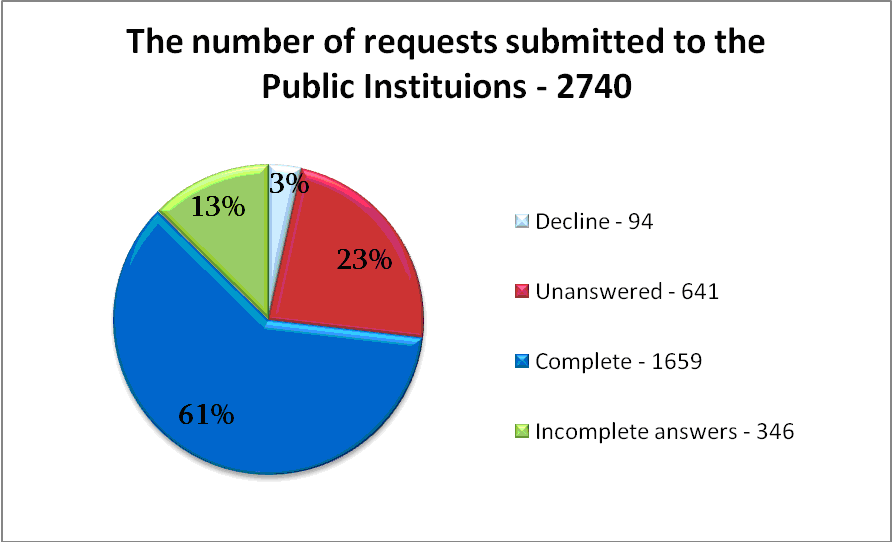 “According to the survey, which was carried out in 80 counties of the world, Georgia is the first country after New Zealand in terms of the most effective and transparent functioning of the state office. Nothing to say about Russia, Venezuela and other countries, even France, Germany and Japan are behind us in the list of the survey. This is the result of the reforms that we, all together, holding the last few years. It’s a pride that I have as a result of your activities. Let’s remind where we were 6-7 years ago and where we are now” – said Mikheil Saakashvili, President of Georgia, on October 19, 2011 at the meeting with public officials.
“According to the survey, which was carried out in 80 counties of the world, Georgia is the first country after New Zealand in terms of the most effective and transparent functioning of the state office. Nothing to say about Russia, Venezuela and other countries, even France, Germany and Japan are behind us in the list of the survey. This is the result of the reforms that we, all together, holding the last few years. It’s a pride that I have as a result of your activities. Let’s remind where we were 6-7 years ago and where we are now” – said Mikheil Saakashvili, President of Georgia, on October 19, 2011 at the meeting with public officials.
In fact, if we look at the results of the research, which covered 80 countries, implemented by the trustworthy international non governmental organizations (“Centre for Law and Democracy”, “Access Info Europe”, “International Budget Partnership”), we’ll discover that Georgia is one of the top countries in terms of access to public information and significantly ahead of an institutionally strong democratic states as France, Norway or even the USA:
http://www.law-democracy.org/?page_id=94
The second place of Georgia in the international rating of access to public information was a surprise for the Georgian journalists and experts; for the professionals, working in the field of public information and I’m sure even for the Administration of the President of Georgia, which often uses the international ratings for the illustration of the Georgian reforms very flexibly.
I think this kind of result needs the adequate explanation.
The place of Georgia in rating system
Rating is published in the report, which was prepared by the three non governmental organizations in the framework of the campaign “Ask Your Government. The 6 Questions Campaign”. Questions were divided into three thematic categories: Mother and Child Health, Environmental Protection and International Aid. By the support of the local partners (in this campaign “Transparency International Georgia” was Georgian participant) questions were submitted to the relative institutions of the 80 different countries of the world.
Research showed that, public institutions of Georgia provided complete responses in 4 cases from the 6. At the same time, research showed that Georgian public institutions needed approximately 11 calendar days for the reply. As compared to other countries, this period of time can be considered as truly outstanding. It will be motioned, that Georgian Law obliges public institutions to provide information directly or within 10 working days, so answers were provided in accordance of the Georgian Law.
Despite of the results, it should be underlined some facts. At first, 2 incomplete answers from 6 indicated to the fact that despite of the high results in comparison to other countries, problems are still exist. At the same time, Georgia, Armenia and Namibia (Namibia still has not adopted RTI Law) placed in top five, cannot be considered as a developed democratic states. This raises many questions whether this report represents the factual situation regarding the accessibility of information in the target countries.
Another important fact, which should be mentioned, is the outlined tendency on the bases of various researches, that countries of new democracies often have better results in terms of access to information than the counties with developed democracy. From my point of view, one of the best example is the very interesting research, held under the aegis of “Centre for Law and Democracy” and “Access Info Europe”. In the framework of the international project, were assessed the RTI (Right to Information Act) legislation of 89 counties of the world. As a result, it turned out, that RTI legislation of all three South Caucasus countries are much more refined than the RTI legislation of United States, Canada or the Netherlands: http://rti-rating.org/results.html the report explains the logic of such trend as the following: „the top 20 countries with scores over 100 tend to be younger laws which reflect the progress made in international standard setting on this right in the past 20 years: with the exception of Finland (a score of 105 for a legal framework which includes a law adopted in 1951) the average age of the laws in the top 20 countries is just 5 years. “
Is it possible to determine the quality of effective and transparent functioning of the State on the bases of responds given to only 6 questions?
Answer to this question can be found in reports, which were prepared by the NGO-s working on access to public information (“Georgian Young Lawyers Association”, “Transparency International Georgia” and others) among of them “Institute for Development of Freedom of Information” (IDFI) in the framework of the project “Public Information Database – www.opendata.ge”. Within the project IDFI requests public information from nearly every public institutions of Georgia. Information officially received by the Institute is uploaded on the online database. At the same time, the relevant statistics is prepared and according to this, situation regarding to the access to public information in Georgia is not as perfect as it’s shown in the survey.
For example, we can review the statistics of the 1st phase of the project: out of 2 740 requests submitted 641 were fully ignored and 346 are responded in incomplete form. As the result, the total number of requests ignored and rejected reached 26%.
The cumulative statitstics can be used for a further example to show that the access to public information may depend on a number of factors: state institutions where requests had been submitted, content of information requested, the personal attitude of the executive of the state authority to the issue of accountability, reputation of the organization that requests the information and etc.
For example, according to the quarterly report of the IDFI, in case of 16 Ministries, 47.40% of requests were fully ignored and 77.6% of answers were delivered in violation of time frames:
http://www.opendata.ge/en#!lang/en/cat/monitoring_2011_charts/filter/4
In order not to limit ourselves with only figures, a few examples will be enough to show the real situation. For example, IDFI together with other organizations in Georgia are trying to receive public information about the expenses of the new parliament building in Kutaisi and the information about who is in charge of the construction. Also, IDFI hasn’t received copies of president’s orders and etc.
Problems in receiving the public information are also confirmed by the experience of those journalists, who are facing significant problems in the process of requesting the specific documents; the same fact is affirmed by the litigations on the issues of public information, held on a regular basis.
Despite of the above mentioned problems, our experience confirms the fact, that access to public information, despite the general shortcomings and problems, is better in comparison with the previous years and the report published by the Centre for Law and Democracy prove this fact. However, I think it would be superfluous to declare, that state office of Georgia is the most effective and transparent among the 80 states of the world. I’m sure it will actually be implemented in the near future, only in the case of active and effective cooperation between the civil society and political elites. Unfortunately, today problems are reflecting on achievements in the case of RTI.
Levan Avalishvili is a co-founder and chairman of the board of the Institute for Development of Freedom of Information (IDFI) and Director of the project “Public Information Database – www.opendata.ge” which is intended to promote transparency and accountability of state authorities and access to public information in Georgia.



Levan, interesting piece of analysis! As TI Georgia did the field research for this initiative, we have also posted a clarification on our blog, after some media outlets intentionally misrepresented the findings and implications of this particular survey.
http://transparency.ge/en/blog/psix-questions-georgia-shouldn%E2%80%99t-rest-its-laurelsp
Mathias,
TI Georgia